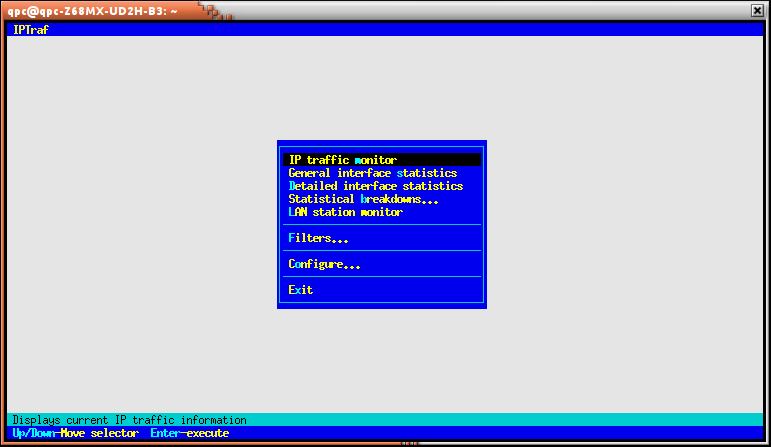IPTraf is an open source ncurses-based IP LAN monitor that generates various network statistics including TCP info, UDP counts, ICMP and OSPF information, LAN station packet, Ethernet load info, node stats, IP checksum errors, and others.
This program can be used to determine the type of traffic on your network, and what kind of service is the most heavily used on what machines, among others.
IPTraf can be used to monitor the load on an IP network, the most used types of network services, the proceedings of TCP connections, and others. IPTraf was designed from the ground up to use the Linux PF_PACKET mechanism to reduce overhead.
Features include:
- Full-screen, menu-driven operation
- Background operation.
- IP traffic monitor that shows information on the IP traffic passing over your network. Includes TCP flag information, packet and byte counts, ICMP details, OSPF packet types.
- All IP traffic can be filtered with a unified set of filter rules which makes it easier to define filters for for all IP traffic to or from a certain host or network without having to define three distinct filters.
- General and detailed interface statistics showing IP, TCP, UDP, ICMP, non-IP and other IP packet counts, IP checksum errors, interface activity, packet size counts.
- TCP and UDP service monitor showing counts of incoming and outgoing packets for common TCP and UDP application ports.
- LAN statistics module that discovers active hosts and shows statistics showing the data activity on them.
- TCP, UDP, and other protocol display filters, allowing you to view only certain types of traffic.
- Utilizes the built-in raw socket interface of the Linux kernel, allowing it to be used over a wide range of supported network cards.
- Supports the following protocols: IP, TCP, UDP, ICMP, IGMP, IGP, IGRP, OSPF, ARP, RARP, L2TP, IPSec Authentication, and IPSec Encrypted Payload.
- Supported interfaces: Local loopback, All Linux-supported Ethernet interfaces, All Linux-supported FDDI interfaces, SLIP, Asynchronous PPP, Synchronous PPP over ISDN, ISDN with Raw IP encapsulation, ISDN with Cisco HDLC encapsulation, Parallel Line IP, TUN, BRG.
- Force promiscuous mode – so that traffic which does not pass directly through the specified interface is also counted. Promiscuous mode is often used to diagnose network connectivity issues.
- Logging.
- Timers: TCP timeout, Logging interval, Screen update interval, TCP closed/idle persistence.
- Reverse DNS lookups.
Website: iptraf.seul.org
Support: Documentation
Developer: Gerard Paul Java
License: GNU General Public License v2.0

Return to Console Based Network ‘top’ Tools
| Popular series | |
|---|---|
| The largest compilation of the best free and open source software in the universe. Each article is supplied with a legendary ratings chart helping you to make informed decisions. | |
| Hundreds of in-depth reviews offering our unbiased and expert opinion on software. We offer helpful and impartial information. | |
| The Big List of Active Linux Distros is a large compilation of actively developed Linux distributions. | |
| Replace proprietary software with open source alternatives: Google, Microsoft, Apple, Adobe, IBM, Autodesk, Oracle, Atlassian, Corel, Cisco, Intuit, and SAS. | |
| Awesome Free Linux Games Tools showcases a series of tools that making gaming on Linux a more pleasurable experience. This is a new series. | |
| Machine Learning explores practical applications of machine learning and deep learning from a Linux perspective. We've written reviews of more than 40 self-hosted apps. All are free and open source. | |
| New to Linux? Read our Linux for Starters series. We start right at the basics and teach you everything you need to know to get started with Linux. | |
| Alternatives to popular CLI tools showcases essential tools that are modern replacements for core Linux utilities. | |
| Essential Linux system tools focuses on small, indispensable utilities, useful for system administrators as well as regular users. | |
| Linux utilities to maximise your productivity. Small, indispensable tools, useful for anyone running a Linux machine. | |
| Surveys popular streaming services from a Linux perspective: Amazon Music Unlimited, Myuzi, Spotify, Deezer, Tidal. | |
| Saving Money with Linux looks at how you can reduce your energy bills running Linux. | |
| Home computers became commonplace in the 1980s. Emulate home computers including the Commodore 64, Amiga, Atari ST, ZX81, Amstrad CPC, and ZX Spectrum. | |
| Now and Then examines how promising open source software fared over the years. It can be a bumpy ride. | |
| Linux at Home looks at a range of home activities where Linux can play its part, making the most of our time at home, keeping active and engaged. | |
| Linux Candy reveals the lighter side of Linux. Have some fun and escape from the daily drudgery. | |
| Getting Started with Docker helps you master Docker, a set of platform as a service products that delivers software in packages called containers. | |
| Best Free Android Apps. We showcase free Android apps that are definitely worth downloading. There's a strict eligibility criteria for inclusion in this series. | |
| These best free books accelerate your learning of every programming language. Learn a new language today! | |
| These free tutorials offer the perfect tonic to our free programming books series. | |
| Linux Around The World showcases usergroups that are relevant to Linux enthusiasts. Great ways to meet up with fellow enthusiasts. | |
| Stars and Stripes is an occasional series looking at the impact of Linux in the USA. | |
